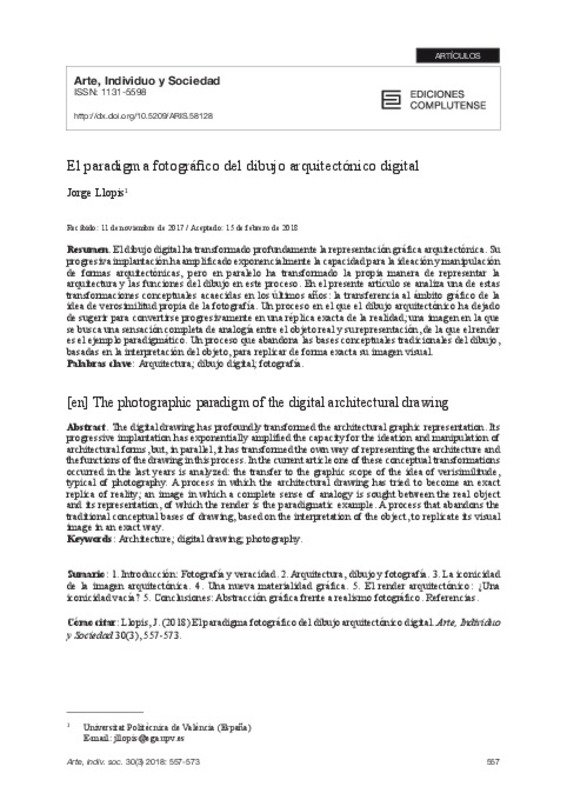JavaScript is disabled for your browser. Some features of this site may not work without it.
Buscar en RiuNet
Listar
Mi cuenta
Estadísticas
Ayuda RiuNet
Admin. UPV
El paradigma fotográfico del dibujo arquitectónico digital
Mostrar el registro sencillo del ítem
Ficheros en el ítem
| dc.contributor.author | Llopis Verdú, Jorge
|
es_ES |
| dc.date.accessioned | 2019-06-21T20:03:22Z | |
| dc.date.available | 2019-06-21T20:03:22Z | |
| dc.date.issued | 2018 | es_ES |
| dc.identifier.issn | 1131-5598 | es_ES |
| dc.identifier.uri | http://hdl.handle.net/10251/122517 | |
| dc.description.abstract | [EN] The digital drawing has profoundly transformed the architectural graphic representation. Its progressive implantation has exponentially amplified the capacity for the ideation and manipulation of architectural forms, but, in parallel, it has transformed the own way of representing the architecture and the functions of the drawing in this process. In the current article one of these conceptual transformations occurred in the last years is analyzed: the transfer to the graphic scope of the idea of verisimilitude, typical of photography. A process in which the architectural drawing has tried to become an exact replica of reality; an image in which a complete sense of analogy is sought between the real object and its representation, of which the render is the paradigmatic example. A process that abandons the traditional conceptual bases of drawing, based on the interpretation of the object, to replicate its visual image in an exact way. | es_ES |
| dc.description.abstract | [ES] El dibujo digital ha transformado profundamente la representación gráfica arquitectónica. Su progresiva implantación ha amplificado exponencialmente la capacidad para la ideación y manipulación de formas arquitectónicas, pero en paralelo ha transformado la propia manera de representar la arquitectura y las funciones del dibujo en este proceso. En el presente artículo se analiza una de estas transformaciones conceptuales acaecidas en los últimos años: la transferencia al ámbito gráfico de la idea de verosimilitud propia de la fotografía. Un proceso en el que el dibujo arquitectónico ha dejado de sugerir para convertirse progresivamente en una réplica exacta de la realidad; una imagen en la que se busca una sensación completa de analogía entre el objeto real y su representación, de la que el render es el ejemplo paradigmático. Un proceso que abandona las bases conceptuales tradicionales del dibujo, basadas en la interpretación del objeto, para replicar de forma exacta su imagen visual. | es_ES |
| dc.language | Español | es_ES |
| dc.publisher | Universidad Complutense de Madrid | es_ES |
| dc.relation.ispartof | Arte individuo y sociedad | es_ES |
| dc.rights | Reconocimiento (by) | es_ES |
| dc.subject | Architecture | es_ES |
| dc.subject | Digital drawing | es_ES |
| dc.subject | Photography | es_ES |
| dc.subject.classification | EXPRESION GRAFICA ARQUITECTONICA | es_ES |
| dc.title | El paradigma fotográfico del dibujo arquitectónico digital | es_ES |
| dc.title.alternative | The photographic paradigm of the digital architectural drawing | es_ES |
| dc.type | Artículo | es_ES |
| dc.identifier.doi | 10.5209/ARIS.58128 | es_ES |
| dc.rights.accessRights | Abierto | es_ES |
| dc.contributor.affiliation | Universitat Politècnica de València. Departamento de Expresión Gráfica Arquitectónica - Departament d'Expressió Gràfica Arquitectònica | es_ES |
| dc.description.bibliographicCitation | Llopis Verdú, J. (2018). El paradigma fotográfico del dibujo arquitectónico digital. Arte individuo y sociedad. 30(3):557-573. https://doi.org/10.5209/ARIS.58128 | es_ES |
| dc.description.accrualMethod | S | es_ES |
| dc.relation.publisherversion | https://doi.org/10.5209/ARIS.58128 | es_ES |
| dc.description.upvformatpinicio | 557 | es_ES |
| dc.description.upvformatpfin | 573 | es_ES |
| dc.type.version | info:eu-repo/semantics/publishedVersion | es_ES |
| dc.description.volume | 30 | es_ES |
| dc.description.issue | 3 | es_ES |
| dc.relation.pasarela | S\383799 | es_ES |








